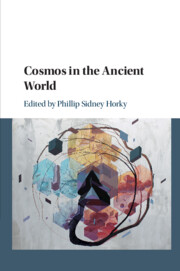Refine search
Actions for selected content:
13 results
Chapter 5 - Physis on the Battlefield
-
- Book:
- Herodotus and the Presocratics
- Published online:
- 07 March 2024
- Print publication:
- 14 March 2024, pp 141-166
-
- Chapter
-
- You have access
- Open access
- HTML
- Export citation
Chapter 5 - Order and Orderliness
-
-
- Book:
- Cosmos in the Ancient World
- Published online:
- 18 June 2019
- Print publication:
- 04 July 2019, pp 108-121
-
- Chapter
- Export citation
Afterword
-
-
- Book:
- Cosmos in the Ancient World
- Published online:
- 18 June 2019
- Print publication:
- 04 July 2019, pp 295-303
-
- Chapter
- Export citation
Introduction
-
-
- Book:
- Cosmos in the Ancient World
- Published online:
- 18 June 2019
- Print publication:
- 04 July 2019, pp 1-21
-
- Chapter
- Export citation
Chapter 6 - Polis as Kosmos in Plato’s Laws
-
-
- Book:
- Cosmos in the Ancient World
- Published online:
- 18 June 2019
- Print publication:
- 04 July 2019, pp 122-141
-
- Chapter
- Export citation
Chapter 3 - Diakosmêsis
-
-
- Book:
- Cosmos in the Ancient World
- Published online:
- 18 June 2019
- Print publication:
- 04 July 2019, pp 62-73
-
- Chapter
- Export citation
Chapter 4 - Aristotle on Kosmos and Kosmoi
-
-
- Book:
- Cosmos in the Ancient World
- Published online:
- 18 June 2019
- Print publication:
- 04 July 2019, pp 74-107
-
- Chapter
- Export citation
Chapter 7 - Relating to the World, Encountering the Other
-
-
- Book:
- Cosmos in the Ancient World
- Published online:
- 18 June 2019
- Print publication:
- 04 July 2019, pp 142-163
-
- Chapter
- Export citation
Chapter 13 - Cosmic Spiritualism among the Pythagoreans, Stoics, Jews and Early Christians
-
-
- Book:
- Cosmos in the Ancient World
- Published online:
- 18 June 2019
- Print publication:
- 04 July 2019, pp 270-294
-
- Chapter
- Export citation
Chapter 2 - Ordering the Universe in Speech
-
-
- Book:
- Cosmos in the Ancient World
- Published online:
- 18 June 2019
- Print publication:
- 04 July 2019, pp 42-61
-
- Chapter
- Export citation
Chapter 10 - All the World’s a Stage
-
-
- Book:
- Cosmos in the Ancient World
- Published online:
- 18 June 2019
- Print publication:
- 04 July 2019, pp 212-231
-
- Chapter
- Export citation
Chapter 1 - When Did Kosmos Become the Kosmos?
-
-
- Book:
- Cosmos in the Ancient World
- Published online:
- 18 June 2019
- Print publication:
- 04 July 2019, pp 22-41
-
- Chapter
-
- You have access
- HTML
- Export citation

Cosmos in the Ancient World
-
- Published online:
- 18 June 2019
- Print publication:
- 04 July 2019
